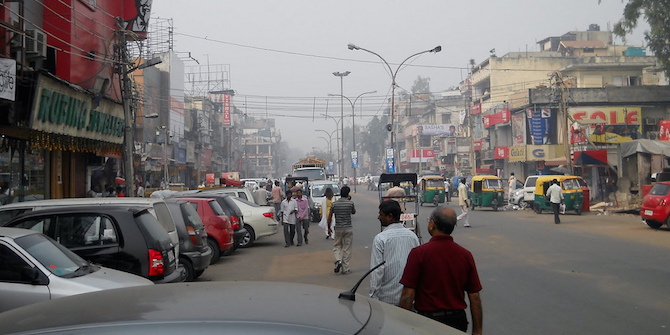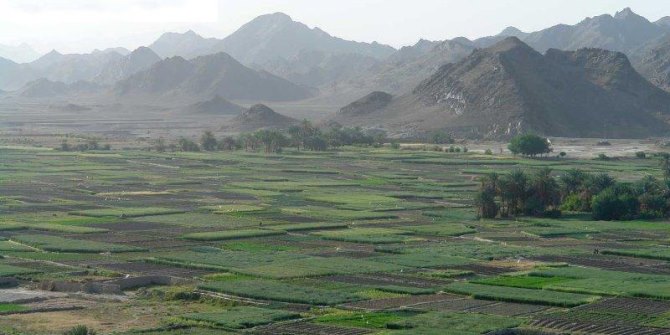As India fights Covid-19, the requirement for enhanced social protection highlights the need to operate a non-Aadhaar-based Public Distribution System for food, argues Silvia Masiero (Loughborough University). Drawing on insights from her research, she suggests how the vital scheme could be enacted in such unprecedented times.
Announced by India’s Prime Minister on March 19, India’s lockdown differs from many other national lockdowns introduced due to Covid-19, principally for two reasons. First, India has a very large population of informal workers (over 80 percent, according to the Employment-Unemployment Survey report cited by Khera); second, a large population of those workers who travel on a seasonal or periodic basis to their work sites. Due to the lockdown, a large majority of informal workers have lost their main source of income, while numerous internal migrants have been stranded and disconnected from their regions, cities or towns of origin. As Jean Drèze recently noted, the ongoing health crisis in India is also an economic crisis, whose impact is disproportionately hurting the poor.
India relies on a large social protection system, and over the last few days, economists have suggested numerous ways to use different welfare schemes to sustain the poor during lockdown. Jean Drèze suggests measures including advance payment of pensions, enhanced rations, immediate payment of salary arrears in NREGA and extended distribution of take-home rations. Reetika Khera similarly suggests a detailed set of interventions including immediate NREGA wage payments, cash assistance and health-related measures for vulnerable communities. A common point among these suggested interventions is that India needs to capitalise on the existing social welfare system rather than creating new ones, which would require time that the emergency just does not permit.
In India’s current crisis, the Public Distribution System (PDS) – the programme of distribution of subsidised goods that constitute the main food security net in the country – is of fundamental importance for the poor households that access it. Still operational during lockdown, the PDS ration shops will supply essential food items to households that, while already in poverty, will be bearing the severe economic impact of lockdown. The PDS provides subsidised goods to below-poverty-line (BPL) households throughout the country, as well as those classified as Antiyodaya Anna Yojana (AAY) – the poorest of the poor – who access enhanced rations. In the serious economic downturn of the lockdown, it is key that the national food security network works at its best capacity.
Due to the Covid-19 pandemic, the Aadhaar-based PDS (now operating in most states) presents issues related to the transmission of the virus. Legally backed by the Targeted Delivery of Financial and Other Subsidies, Benefits and Services Act, known as Aadhaar Act (2016), the Aadhaar-based PDS subordinates access to the PDS to identification of users through Aadhaar, the biometric database of India’s national residents. This system, which has been questioned in terms of its effects on poverty, economic redistribution and data justice, should not be used now, due to risk of transmission determined by the user’s fingerprint contact with the machine. Reetika Khera notes that several states (Kerala, Chhattisgarh, Jharkhand and Odisha) have already suspended the Aadhaar-based PDS, and a central notification is urgently required.
 Photo: An Aadhaar-based ration shop, Bangalore, April 2018. Credit: Author
Photo: An Aadhaar-based ration shop, Bangalore, April 2018. Credit: Author
My research on the computerisation of the PDS, which I started studying in Kerala in 2010, began when Aadhaar – launched in the same year – was not yet an integral part of the PDS. Now, with the enhanced importance of the PDS during the crisis and the need not to use Aadhaar in it, the practical problem of devising guidelines for a non-biometric PDS unfolds. Some guidelines that my research suggests are as follows.
First, as a result of the lockdown, many PDS users are currently stranded away from their regions of residence. This makes it essential to introduce portability, meaning users’ ability to access the system from each ration shop in the country: in the PDS as it is, users can only access goods in the ration shop where they are registered. Ration cards (the physical document of entitlement to the PDS) have not been replaced by Aadhaar, but just complemented by it, meaning that users still need their ration card when they go to the ration shop. The persistence of the physical document has an important affordance: it allows ration dealers, in principle, to supply rations to any user that presents a valid ration card, hence enabling the transition to a portable PDS.
Second, physical record-taking can substitute the Aadhaar-enabled logging of PDS transactions. Before Aadhaar came into place, ration dealers logged transactions in a dedicated booklet, which they still do – only, they now log the Aadhaar identifier of recipients too. But the monthly record of transactions can easily exist without Aadhaar identification: in the ration dealers’ booklets, transactions can be logged using recipients’ ration card numbers, which can be checked by food inspectors through the state ration card database. The risk of duplication (users presenting bogus or duplicated ration cards to the dealer), against which the biometric system was designed, does exist, but is at a minimum if compared to the risk of leaving vulnerable users without food provisions under lockdown.
Third, the system needs to ensure that ration dealers are able to collect goods from the local Authorised Wholesale Dealer (AWD) every month. This is currently done showing the record of Aadhaar-enabled transactions to the AWD, as proof that transactions have occurred with entitled users rather than on illicit markets. But as a result of the persistence of ration cards, this process can be Aadhaar-free too: the log of monthly transactions can be done through the ration card number, rather than the Aadhaar number, of each user. True, the risk of diversion by the ration dealer exists (a risk that, as noted elsewhere, not even Aadhaar eliminates completely): but even here, the risk is minimum if compared to that of denying food supplies to poor households during the emergency.
The ongoing crisis requires a reshuffling of priorities: with the lockdown and its serious impact on the poor, the PDS has become an even more fundamental resource for subsistence. The incorporation of biometrics in it has been designed to improve targeting, but the emergency implies that ensuring supplies to the needy is more important that taking measures to combat inclusion errors. The measures suggested here, referred to the Aadhaar-free PDS that is now needed, are important to guarantee social protection.
This article gives the views of the author, and not the position of the South Asia @ LSE blog, nor of the London School of Economics. Featured Photo: Covid-19 Virus. Credit: ar130405, Pixabay.








1 Comments